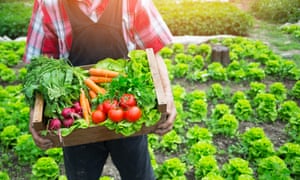If chefs back sustainable food, consumers will follow, writes Lucky Peach founder Chris Ying

Alot of people who cook food – and even more who write about it – have asked themselves at some point what the hell they’re doing. Particularly recently, as deeply entrenched institutional inequalities and biases are brought to light – not only in food but across numerous industries – a nagging question presents itself: am I doing something meaningful with my life?
These panicky moments vary in severity. Some are passing irritations that strike as we stand at the sink peeling a bucket of carrots, or while staring blankly at white pixels on a screen trying to come up with yet another word for “delicious”. Other times, it feels existential. More than a few people have left successful restaurant careers to pursue something they find more consequential. But the narrative you hear more frequently is about the person who leaves their desk job to work with something more tangible – namely food.
This is more or less my experience. I worked for the better part of a decade editing books – oral histories documenting human rights crises, experimental fiction, literary nonfiction, that sort of thing. If you’d asked me at the time, I would have labelled such work as serious work, as opposed to my lifelong interest in food, which I would have described as frivolous. And I would have been correct on some level. While for most of human existence, food has been a survival necessity, it hasn’t been confined to that role for more than a millennium. In the economically advantaged parts of the world, the majority of us don’t eat most of our meals because we need to; we eat because we want to.
But my experience of working in the food world has been different from what I expected. Seven years ago, I left my serious publishing job to make a food magazine called Lucky Peach. At one point during the magazine’s run, I doubled down on the food world and started a nonprofit organisation called ZeroFoodprint, which helps restaurants understand and reduce their climate impact. Whenever I ask myself what the hell I’m doing, I try to take the long view of these two endeavours.
I won’t get too deep into the nitty-gritty of restaurants’ relationship to climate change, but the long and short of it is that growing, shipping, cooking and disposing of food is a major contributor to greenhouse gases. It’s not impossible to counteract the effect – in fact, it’s easier than people think – but it still takes time and thought and a little bit of money. But the payoff for doing so is largely intangible: you feel better about yourself and there’s some unsubstantiated logic that, if you do right by the world, people will notice and come to your restaurant.
But even with such vague rewards, restaurants have been eager to do their part. Chefs and restaurateurs reach out to our organisation to ask how they can contribute. They open up to us about how much money they spend on ingredients and energy, where it comes from and how they use it. Then they listen to what they can do better. It’s a mind-boggling and uplifting thing to witness.
We’ve helped multiple restaurants go completely carbon-neutral, and dozens more reduce their emissions. For instance, a few years ago, the restaurant Noma in Copenhagen learned through our study that they were getting their electricity from a coal-fired power plant. By sending an email to their power company and requesting their power source be switched to a sustainable one, they reduced their emissions by 30%. Their energy bill went up, but they didn’t flinch.
There are limitations to what restaurants can change, of course. Of all the things we eat, commodity-raised beef is the single largest contributor to climate change, owing mostly to poor manure-disposal techniques. High-end restaurants can turn to more sustainable choices (grass-fed and “carbon-ranched” cattle are better alternatives) but as long as diners want $1 cheeseburgers, feedlot cows will continue to fart and poop our planet warmer. Plus, in the grand scheme of things, the restaurant industry makes up only a small part of the food system, which accounts for somewhere around a third of the world’s greenhouse gases. Even if we recruited a thousand restaurants to go carbon-neutral, it wouldn’t change the trajectory of the climate.
But this is where the frivolous side of food is important. Food is not simply a commodity – it’s a cultural undertaking. In fact, it’s pop culture. People admire chefs and covet restaurants. If chefs as a group decide that sustainable food is better food, consumers will follow. Twenty-five years ago, organic produce meant very little to most people. Thanks largely to the work of chefs, organic is now a widely held value.
And there’s the rub. Food’s not a worthwhile pursuit in spite of its frivolity, but rather because of it. Whenever my chosen profession has me questioning my purpose, I think about the countless meals I’ve had in the pursuit of good food and good stories – many of them with people who look differently, speak differently and believe and uphold opposing values to my own. It’s too optimistic to say food can bridge these divides, but I think it can be shared ground.
We can choose to believe we have nothing in common with people on the other side of the aisle or the world, but the way we eat proves otherwise. I’ve sat in restaurants with people whom I’d never want to socialise with and had dinner with people whose opinions differ totally from mine except for a mutual affection for pizza and cold, cheap beer. That might not sound like much, but it’s enough to get us around the same table.
[“Source-theguardian”]




